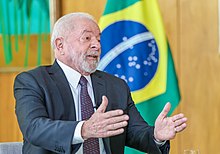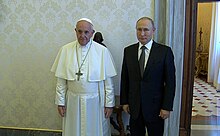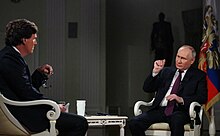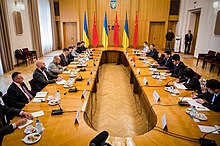Peace negotiations in the Russian invasion of Ukraine
[29] In April 2023, Russian Foreign Minister Sergei Lavrov said that he wanted any negotiations to focus on creating a "new world order" to counter the hegemony of the United States.
[30] In January 2024, Putin again made statements which suggested, according to the Institute for the Study of War, that his "maximalist objectives in Ukraine" remained unchanged, "which are tantamount to full Ukrainian and Western surrender".
[36] Russia's Ministry of Defense announced "drastic reduction of military activity" on the Kyiv and Chernihiv fronts, which, Russian presidential aide Vladimir Medinsky clarified, was not tantamount to a ceasefire.
[77] In June 2023, Belarus president Alexander Lukashenko claimed, in an interview with Russia-1, that Ukrainian and Russian delegations also discussed the possibility of "some sort of a lease" of Crimea during the March 2022 negotiations.
Lastly, Lavrov stated, "Despite all the provocations, the Russian delegation will continue with the negotiation process, pressing for our own draft agreement that clearly and fully outlines our initial and key positions and requirements.
[77] On 11 April, the Chancellor of Austria, Karl Nehammer, visited and spoke with Putin in Moscow in 'very direct, open and hard' talks which were skeptical of the short-term peaceful resolution of the invasion.
[87] According to U.S. officials who spoke to Foreign Affairs, a provisional agreement was reached in April, whereby the Russian forces would withdraw to the pre-invasion line and Ukraine would commit not to seek to join NATO in exchange for security guarantees from a number of countries.
Kissinger changed his initial suggestion and presented it at the World Economic Forum in Davos in January 2023, where he announced that NATO membership for Ukraine would be an "appropriate outcome" from his perspective.
[29] On 28 December 2022, Russian Foreign Minister Sergey Lavrov stated that peace talks with Ukraine would only resume if it recognized Russia's sovereignty over the annexed and partially occupied regions.
"[122] Andrii Sybiha, deputy head of Zelenskyy’s office, told the Financial Times: "If we will succeed in achieving our strategic goals on the battlefield and when we will be on the administrative border with Crimea, we are ready to open [a] diplomatic page to discuss this issue.
[125] In April 2023, Brazilian president Luiz Inácio Lula da Silva suggested that Ukraine should "give up Crimea" to end the war, saying Zelenskyy "can not want everything".
[127] He said Brazil advocates a "negotiated political solution to the conflict" and expressed "concern" about the "global consequences" of the war "in terms of food and energy security, especially in the poorest regions of the planet.
U.S. National Security Council spokesman John Kirby responded by accusing Lula of "parroting Russian and Chinese propaganda", describing his comments as "simply misguided" and "suggesting the United States and Europe are somehow not interested in peace, or that we share responsibility for the war".
[135] On 3 June, Indonesia's defense minister Prabowo Subianto proposed a multi-point peace plan including a ceasefire and establishing a demilitarised zone observed and monitored by the United Nations Peacekeeping Forces.
"[142] After a meeting with African leaders in Kyiv, Ukrainian president Volodymyr Zelenskyy said that peace talks with Russia would be possible only after Moscow withdraws its forces from the entire occupied territory.
"[154] Lavrov also said that Russia did not see "any serious proposals from the West" and he argued that they were promoting Ukrainian president Volodymyr Zelenskyy 'peace formula' as "the sole basis for negotiations" and that there was "no point in discussing it as it is nothing but an ultimatum.
In September 2023, he stated in an interview: "Why don't we force the warring parties, use the weight of the EU and the U.S. to make them sit down and find some sort of compromise that would guarantee security for Ukraine?
According to Latvia-based Russian journalist Leonid Ragozin, "Putin's endgame appears to be getting an agreement along the lines of what has been tentatively achieved in Istanbul, but this time with all the territories which Russia occupied and formally annexed after these talks fell through.
[179] According to Russian sources, the United States rejected Putin's proposal for a ceasefire, which reportedly was to freeze the conflict at the current frontlines and for Russia to keep the land it occupied.
[170] On 4 March 2024, Dmitry Medvedev, the deputy secretary of Russia's Security Council chaired by Putin, made a speech in which he ruled out peace talks with Ukraine's current leadership.
[188] Italian Defense Minister Guido Crosetto expressed opposition to further escalation and stressed the need to "leave open the possibility of negotiating an immediate truce and initiating peace talks in the coming months.
[199] On 7 November, Russia's Security Council Secretary Sergei Shoigu said that the West should recognize the current situation on the battlefield and start negotiations to end the war in Ukraine.
[202][203][204] On 29 November, Ukrainian president Volodymyr Zelenskyy said in an interview with Sky News: "If we want to stop the hot stage of the war, we should take under the NATO umbrella the territory of Ukraine that we have under our control.
The new US Secretary of Defense, Pete Hegseth, said that "returning to" Ukraine's internationally-recognized ("pre-2014") borders was "an unrealistic objective" and that attempting to regain all territory "will only prolong the war and cause more suffering".
They argued that the evidence revealed "mutual willingness" of Zelenskyy and Putin to "consider far-reaching concessions to end the war", and that an agreement providing Ukraine with multilateral security guarantees, permanent neutrality and EU membership in the long term, was "almost finalised", however "the communiqué had not resolved some key issues".
According to them, three factors involved specific stakeholders: the unwillingness of Ukraine's Western partners to provide security guarantees; Ukrainian public anger at the Bucha atrocities; and Zelenskyy's increased confidence in a military solution with the failure of the Russian attempt to take over Kyiv.
[7] Polish diplomat Jakub Kumoch criticized the analysis of Charap and Radchenko, arguing that they "accepted the Russian narrative" and that the lack of consensus over borders, disarmament of Ukraine and security guarantees blocked any chance of agreement.
[229][230] At the UN General Assembly marking the anniversary of the invasion, Chinese deputy UN ambassador proposed China's plan including a ceasefire, dialogue, security guarantees for Russia, protection of civilians and the upholding of territorial integrity, while also insisting that the West was exacerbating the situation by sending weapons to Ukraine.
[241] According to Steve Tsang, director of the SOAS China Institute in London, "There is no indication that Xi is trying to get Putin or Russia to make concessions of any sort (and) the Chinese readout (of the call) does not include anything concrete that can start a peace process.
[259] A Gallup poll conducted in Ukraine in early September 2022 found that 70% of Ukrainians wanted to continue fighting until they achieve victory, while only 26% favored negotiations to end the war as soon as possible.




















